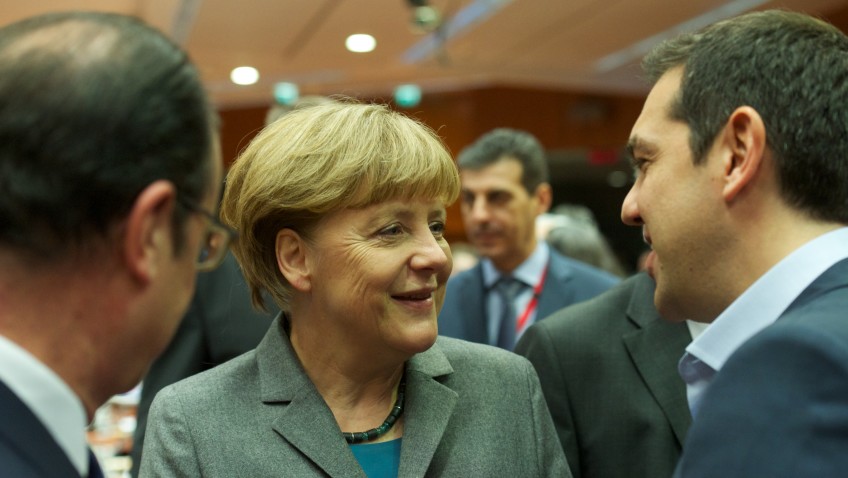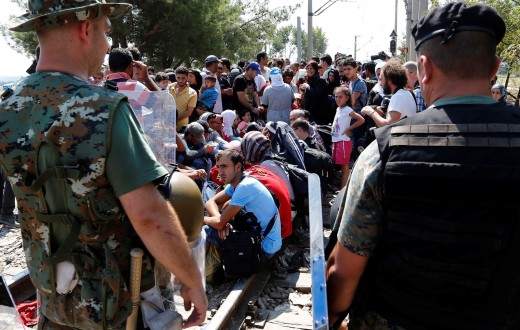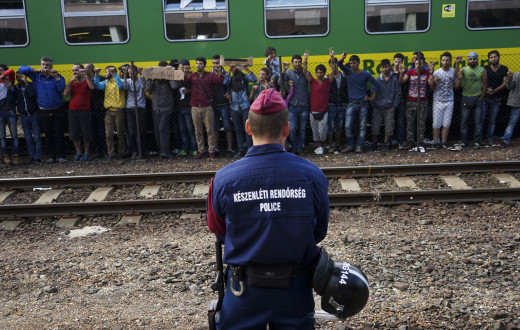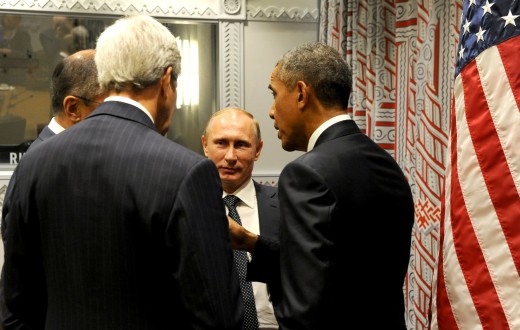Just 9 months after teetering dangerously close into the abyss with Greece, Germany once again finds itself in the center of a storm with its favorite black sheep of the family.
The EU just released an aid proposal for struggling Greece that could amount to over 700 million Euros. It could not come at a better time. The situation on the Macedonian-Greek border is rapidly descending into chaos. A few days ago, migrants in the Greek village of Idomeni took down a barbed-wire security fence en-masse that had been erected by Macedonian authorities in January. Incidents of migrants throwing rocks and retaliatory tear gas barrages were also reported. Meanwhile, the situation in Greece is just as bad, if not worse. Some 13,000 migrants are living in temporary camps, with facilities designed to hold 3,000 people, and supplies are dangerously low. Nationalistic strife aside, both Macedonia and Greece agree it is in their best interest to limit the flow of migrants coming through their countries until the rest of Europe responds to the crisis.
Cue Chancellor Merkel.
After fighting tooth and nail to keep Greece in Europe, Merkel is now stuck with it, for better or for worse. Just recently, she quipped in a TV interview: “Do you seriously believe that all the euro states that last year fought all the way to keep Greece in the Eurozone, and we were the strictest, can one year later allow Greece to, in a way, plunge into chaos?” She is urging the rest of the European leaders to work towards a multilateral solution to the crisis, noting that individual reactions such as closing borders, cannot produce results. The reaction from the domestic German audience and the rest of Europe has been anything but positive, as criticisms have been pouring in left and right. Her approval rating has dropped from an October 2011 high of 75% to 46% in a recent poll, amidst internal dissent calling for a new direction grows in her own center-right Christian Democratic Union party. The far-right party “Alternative for Germany” has also seen a surge in popularity in response to increased criticism towards Merkel, having already gained seats in five state parliaments. Hungary and Poland have respectively painted a big nem/nie (no) on their borders. Even liberal Sweden imposed border controls in January. The pressure is starting to take its toll on the Union and its de-facto leader-Merkel.
In stark contrast to the warm welcome given in Berlin and Munich in September, Merkel is now taking a more hands-off approach to migrants from Greece.Whereas before, migrants could register upon arriving in Germany, now they must go through the registration centers in Greece before they can move on. Greece’s borders are not easily defensible, and given that it is a transit point for many of the migrants, this change will cause an even larger build-up of migrants on Greece’s border with Macedonia. EU and Turkish leaders recently met to come to a new plan–migrants coming to Greece will be returned, and one Syria from Turkey will be given asylum in Greece for every one Syrian returned to Turkey. While still tentative, there is growing concern that such a plan can even be approved and many European leaders themselves are not hopeful–including Merkel herself.
Organizations such as the UN, Doctors Without Borders, and Amnesty International have blasted the plan, claiming it violates international law. UN High Commissioner for Refugees Fillppo Grandi said,”I am deeply concerned about any arrangement that would involve the blanket return of anyone from one country to another without spelling out the refugee protection safeguards under international law.” Amid the growing uncertainty regarding the proposed plan, it looks like it may not be passed at all. Hungary, in a second potential blow to Europe, has already threatened to veto the migrant deal. After all the smoke clears from another failed response to a growing crisis, the EU will set its sights to a particular state once more–Greece. Merkel’s increasingly cold responses to Greece will inevitably set the tone for many other European countries. As if it to relieve themselves of their own guilt and feckless nature on the issue, European leaders will unload it on Greece. They have already threatened Greece with more border closings if it does not meet a May 12th deadline for registering its migrants. Austria, backed by Germany and Sweden, have gone as far as to dangle expulsion from the Schengen Zone. Combine this with the already-occurring domino-like cascade of border closings in the Schengen zone, and Greece, an EU member, is in the middle of the second tsunami of its collective European Union experience.
The Western Balkans route has come to an end due to unilateral actions by certain countries. EU has no future if it goes on like that. (1/2)
— Alexis Tsipras (@tsipras_eu) March 9, 2016
Prime Minister Tsipras has wasted no time blasting EU countries. In face of the new plan, Tsipras remains skeptical about the future of the EU. : “The Western Balkans route has come to an end due to unilateral actions by certain countries. EU has no future if it goes on like that.” European division over extending a bailout to Greece already cast doubt in many Greeks over its role and future with the European Union. Now, with the many in Western Europe closing their doors to the migrants, to many, they are also closing their doors to Greece.







0 comments